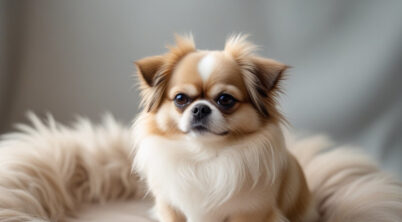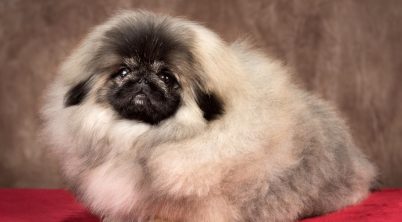The Pekingese, a toy dog breed with a heritage rooted in ancient China, has a temperament that often contradicts its petite size. Known for their strong self-esteem and sometimes described as having a regal demeanor, Pekingese are not inherently mean. However, they carry a bold confidence that was cultivated during their time as companions to Chinese royalty, which can sometimes be misinterpreted as aggression. They are characteristically alert and possess a degree of independence that demands respect and understanding from their owners.
Personality traits of the Pekingese include loyalty and affection towards their family, alongside a tendency to be reserved around strangers. This breed can exhibit a sense of dignity and aloofness, but this does not necessarily equate to a mean disposition. Any perceived stubbornness is often a manifestation of their intelligence and individualistic nature. They may not readily obey commands like more eager-to-please breeds, which requires a patient and consistent approach to training.
The myth of the Pekingese’s meanness is often dispelled once their behavioral patterns are understood in the context of their history and breeding. While they can be protective and vocal in sounding alarms at perceived threats, they generally exhibit this behavior from a sense of duty rather than meanness. It is the duty of Pekingese owners to cultivate a nurturing environment that respects the breed’s characteristics while ensuring they are well-socialized and trained with positive reinforcement methods.
Table of Contents
Are Pekingese Dogs Mean?
Pekingese dogs carry a reputation for being dignified and somewhat aloof, but labeling them as mean may not be accurate. These toy dogs have roots in Chinese royalty which might account for their self-important demeanor.
Personality Traits:
- Independent: The Pekingese is not typically clingy. They enjoy affection but on their own terms.
- Alert: Their keen alertness translates into excellent watchdog capabilities.
- Affectionate: They form strong bonds with their owners and can be quite loving.
They may show standoffish behavior, especially with strangers, but this is more indicative of their reserved nature rather than aggressiveness.
Training and Socialization:
- It is crucial that they receive consistent training.
- Positive reinforcement works well, especially with treats.
- Early socialization helps mitigate any potential snappiness, common in many toy breeds.
Commonly, a Pekingese will show a degree of stubbornness, which may be mistaken for meanness. However, with correct training, they usually exhibit a non-aggressive temperament.
Behavioral Note:
- A Pekingese may become defensive if threatened or provoked.
- They can be protective of their owners.
It is essential for owners to understand that a Pekingese requires patience and a firm but gentle hand in training. Their royal lineage calls for respect and understanding rather than the assumption that they are mean.
Temperament and Behavior
The Pekingese breed exhibits a complex personality that is characterized by its loyal and affectionate nature. Despite its small size, it often has a commanding presence and can exhibit a stubborn streak. They are intelligent dogs that require a firm yet gentle approach in training.
Personality Traits
The Pekingese are independent and opinionated, which can sometimes be mistaken for a mean disposition. However, these dogs are generally good-natured and affectionate towards their families. Their alertness makes them excellent watchdogs, often barking to alert their owners of anything unusual. While not typically guard dogs due to their size, their bravery is not to be underestimated. They possess a regal bearing, perhaps a nod to their ancestry as companions of Chinese nobility. It is important to note that Pekingese can be stubborn, so consistent and respectful training is essential.
Interaction with Families and Children
Pekingese can be wonderful companions for families, displaying loyal and affectionate behavior. When it comes to children, it’s important that interactions are supervised to ensure that children handle the dog gently and respectfully. The breed’s independence means they may not always engage in play, but they typically enjoy being in the company of their family members. When socialized properly, Pekingese can be calm and pleasant with all family members. However, due to their small size, they are better suited for families with older children who understand the need for gentle handling.
Training and Socialization
Training Pekingese dogs can be challenging due to their intelligence paired with stubbornness. Adequate training and socialization are crucial. They respond well to positive reinforcement, and treats can be an effective motivator. Early socialization facilitates adaptability and helps temper potential vocal tendencies when encountering new situations or individuals.
Training Approach
The Pekingese possesses a notable intelligence that should be engaged during training sessions. However, their independent nature may sometimes be mistaken for stubbornness, which calls for a patient and consistent approach. Here are two key strategies for effective training:
- Positive Reinforcement: Reward-based techniques encourage the Pekingese to view training as a rewarding experience. Utilization of treats or praises strengthens desired behavior.
- Consistency: To manage their independent streak, establish a firm and consistent routine. This means setting clear boundaries and adhering to them without wavering.
Importance of Early Socialization
Socialization is a central component of a Pekingese’s development. It shapes their temperament and behavior towards other animals and people. Below outlines the importance of a structured socialization plan:
- Prevent Aggression: Acclimating a Pekingese to various environments from a young age can reduce tendencies towards fear-based aggression or excessive barking.
- Enhance Adaptability: Regular exposure to different situations and individuals fosters a well-adjusted personality that is better equipped to handle new experiences throughout their lives.








